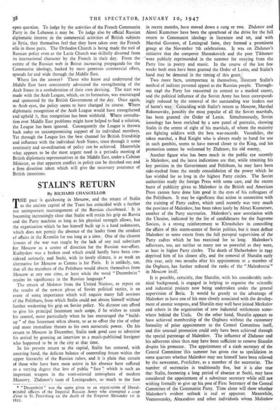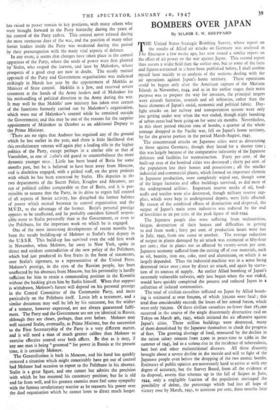STALIN'S RETURN
By RICHARD CHANCELLOR
THE pace is quickening in Moscow, and the return of Stalin to the ancient capital of the Tsars has coincided with a further not unimportant rearrangement of the Russian chessboard. It is becoming increasingly clear that Stalin will retain his grip on Russia and the Party machine as long as his physical strength allows, but the organisation which he has himself built up is a hard taskmaster, which does not permit the absence of the leader from the conduct of affairs in the Kremlin for too long at a time. \ One of the clearest lessons of the war was taught by the lack of any real substitute for Moscow as a centre of direction for the Russian war-effort. Kuibyshev was a broken reed which could hardly have been con- sidered seriously, and Sochi, with its lovely climate, is as weak an alternative for Moscow as Cannes is for Paris. It is unlikely, too, that all the members of the Politburo would absent themselves from Moscow at any one time, at least while the word " Decembrist " retains its significance in the Russian language.* The return of Molotov from the United Nations, to report on the results of the newest phase of Soviet political tactics, is an event of some importance which will require many full sessions of the Politburo, from which Stalin could not absent himself without further weakening his grip on Soviet policy. No dictator can afford to give his principal lieutenant such scope, if he wishes to retain his control, more particularly when he has encouraged the " build- up " of that lieutenant when absent, so as to offset the rise of other and more immediate threats to his own, autocratic power. On his return to Moscow in December, Stalin took good care to advertise his arrival by granting an interview to a much-publicised foreigner who happened to be in the city at that time.
In his present return to the capital, Stalin has restored, with unerring hand, the delicate balance of contending forces within the upper hierarchy of the Russian rulers, and it is plain that certain of those who have been most active in his absence have suffered to a varying degree that loss of public "face'] which is such an important weapon in the semi-oriental atmosphere of modern Muscovy. Zhdanov's team of Leningraders, so much to the fore
* "Decembrist " was the name given to an organ:sation of liberal- minded officers of the Imperial Russian Army who attempted a coup d'itot in St. Petersburg on the death of the Emperor Alexander 1st in 1825.
in recent months, have moved down a rung or two. Zhdanov and Alexei Kuznetsov have been the spearhead of the drive for the full return to Communist ideology in literature and art, and with Marshal Govorov, of Leningrad fame, they formed a prominent group at the November 7th celebrations. It was on Zhdanov's initiative that the composer Shostakovich and the poet Tikhonov
were publicly reprimanded in the summer for straying from the Party line in poetry and music. In the course of the last few weeks both men have been granted the Order of Lenin, and Stalin's hand may be detected in the timing of this grant..3
Two more facts, unimportant in themselves, illustrate Stalin's method of indirect personal appeal to the Russian people. Through-
out 1946 the Party has reasserted its control to a marked extent, and the political influence of the Soviet Army has been correspond- ingly reduced by the removal of the outstanding war leaders out of harm's way.\ 1:Coinciding with Stalin's return to Moscow, Marshal Rokossovsky, possibly the most popular of all the Soviet marshals, has been granted the Order of Lenin. Simultaneously, Soviet iconology has been enriched by a new panel of portraits, showing Stalin in the centre of eight of his marshals, of whom the majority are fighting soldiers with the best war-records. Voroshilov, the token marshal, a Red Knight who is always ready to hand for use in such gambits, seems to have moved closer to the King, and his promotion cannot be welcomed by Zhdanov, his old enemy,2,
Another figure who has been much in the public eye recently is Malenkov, and the latest indications are that, while retaining his key position in the Government and Politburo, he may have been side-tracked from the steady consolidation of the power which he has wielded for so long in the highest Party circles. The Soviet authorities study the foreign Press with some care, and the recent burst of publicity given to Malenkov in the British and American Press cannot have done him good in the eyes of his colleagues of the Politiburo. It may be significant that action in connection with the training of Party cadres, which until recently was very much the province of Malenkov, has been taken lately by Alexei Kuznetsov, another of the Party secretaries. Malenkov's new association with the Ukraine, indicated by the list of candidatures for the Supreme Soviets, is a strong reinforcement to Khrushchev in controlling the affairs of this storm-centre of Soviet politics, but it must deflect . Malenkov to some extent from the full personal supervision of the Party cadres which he has exercised for so long. Malenkov's adherents, too, are neither so many nor so powerful as they were, at least in higher Party circles. The death of Shcherbakov in 1945 deprived him of his closest ally, and the removal of Shatalin early this year, only two months after his appointment as a member of the Orgburo, has further reduced the ranks of the " Malenkovtsi " in Moscow itself.
It is possible, certainly, that Shatalin, with his considerable tech- nical background, is engaged in helping to organise the scientific and industrial projects now being undertaken under the general supervision of Beria. It would be greatly to the advantage of Malenkov to have one of his men closely associated with the develop- ment of atomic weapons, and Shatalin may well have joined Merkulov and others in the organisation of new industrial settlements some- where behind the Urals. On the other hand, Shatalin appears to have achieved membership of the Orgburo without the customary formality of prior appointment to the Central Committee itself, and this unusual promotion could only have been achieved through the special patronage of Maknkov. The influence of Zhdanov and his adherents since then may have been sufficient to remove Shatalin despite his protector.- The appointment of a sixth secretary of the Central Committee -This summer has given rise to spedilation in some quarters whether Malenkov may not himself have been relieved by the newcomer, Patolichev, as a member of the secretariat. The number of secretaries is traditionally five, but it is also true that Stalin, foreseeing a long period of absence at Sochi, may have considered the appointment of a substitute secretary while still not wishing formally to give up his post of First Secretary of the Central Committee of the Communist Party. Time alone will show whether Malenkov's evident setback is real or apparent. Meanwhile, Voznessensky, Alexandrov and other individuals whom Malenkov
has raised to power remain in key positions, with many others who were brought forward in the Party hierarchy during the years of his control of the Party cadres. This control never relaxed during the most strenuous days of the war, and the position of many other Soviet leaders inside the Party was weakened during this period by their preoccupation with the many vital aspects of defence.
In any event, it seems that changes have taken place in the control app=aratus of the Party, where the seeds of power were first planted by Stalin, who reaped the harvest, and later by Malenkov, whose prospects of a good crop are now in doubt. The steady mutual approach of the Party and Government organisations was indicated strikingly in March last year by the appointment of Mekhlis as Minister of State control. Mekhlis is a Jew, and received severe treatment at the hands of the Army leaders and of Malenkov for his mishandling of political direction in the Army during the war. It may well be that Mekhlis' new ministry has taken over certain of the functions formerly carried out by Malenkov's organisation, which were out of Malenkov's control while he remained outside the Government; and this may be one of the reasons for the surprise appointment of Malenkov in October as an additional Deputy to the Prime Minister.
Crhere are no signs that Andreev has regained any of the ground which he lost earlier in the year, and there is little likelihood that this revolutionary veteran will again play a leading role in the higher politics of the Party, except perhaps in a similar role to that of Voroshilov, as one of Stalin's old guard to counterbalance the more dynamic younger men.. Little has been heard of Beria for some months past, but he is believed to have been away from Moscow, and is doubtless engaged, with a picked staff, on the great projects with which he has been entrusted by Stalin. - His deputies in the two departments of the Secret Police, Kruglov and Abramov, are not of political calibre comparable to that of Beria, and it is per- missible to assume that the Party, in its drive to regain full control of all aspects of Soviet activity, has disturbed the former balance of power which existed between its control organisation and the M.V.D., to the advantage of the former. Beria's personal prestige appears to be unaffected, and he probably considers himself respon- sible more to Stalin personally than to the Government, or even to the Politburo, for the important work on which he is engaged. One of the most interesting developments of recent months has been the steady building-up of Molotov as Stalin's first deputy in the U.S.S.R. This build-up has survived even the odd first week in November, when Molotov, far away in New York, spoke in direct and strident contradiction of the new policy of the Politburo, which had just produced its first fruits in the form of statements, over Stalin's signature, to a representative of the United Press. Molotov's prestige, in the eyes of the Russian people, has been unaffected by his absences from Moscow, but his personality is hardly sufficient for him to retain a commanding position in the Kremlin without the backing given him by Stalin himself. When that support is withdrawn, Molotov's future will depend on his personal prestige in the Central Committee of the Communist Party, and more particularly on the Politburo itself. Lenin left a testament, and a similar document may well be left by his successor, but the wishes of a testator, however expressed, are not always guaranteed fulfil- ment. The Party and the Government are not yet identical in Russia, although they are closer, perhaps, than ever before. Molotov may well succeed Stalin, eventually, as Prime Minister, but the succession to the First Secretaryship of the Party is a very different matter, and it will need a than of much greater calibre than Molotov to exercise effective control over both offices. Be that as it may, if any one man is being " groomed " for power in Russia at the present 'time, it is certainly Molotov.
The Generalissimo, is back in Moscow, and his hand has quickly restored a situation which might conceivably have got out of control had Molotov had occasion to report to the Politburo in his absence. Stalin is a great figure, and one cannot but admire the precision .-with which he has resumed his customary position; but he is old and far from well, and his greatest enemies must feel some sympathy with the famous revolutionary warrior as he reasserts his power over the dual organisation which he cannot hope to direct much longer.



































 Previous page
Previous page